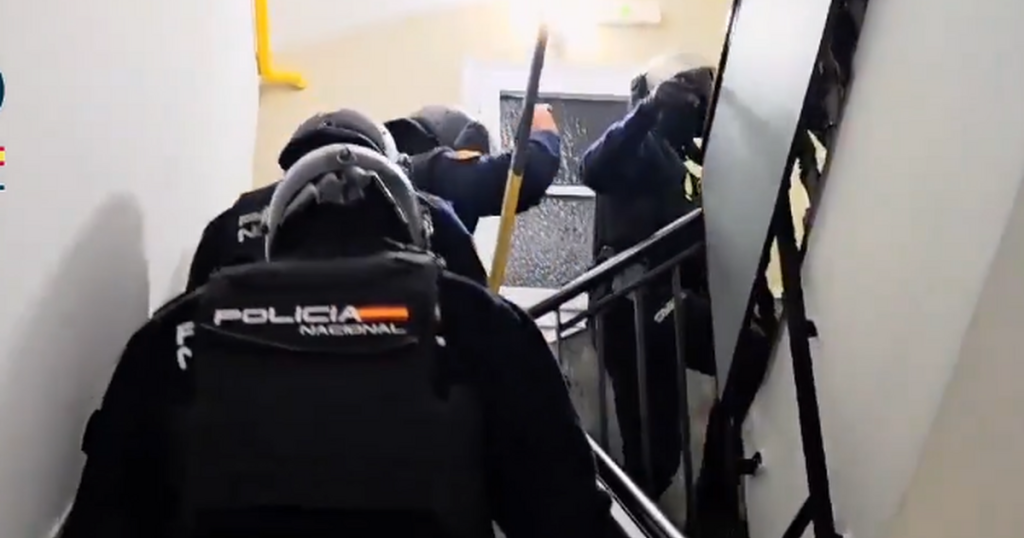Spanish authorities recently uncovered a significant human trafficking operation that exploited over 1,000 women, primarily from Colombia and Venezuela, over the past year. The police conducted a major raid, leading to the rescue of 48 women and the arrest of 48 individuals connected to the trafficking ring, including its presumed leaders. Officials revealed that the victims were misled with false job offers in Spain, only to face severe exploitation upon arrival.
| Article Subheadings |
|---|
| 1) Overview of the Trafficking Operation |
| 2) Recruitment and Exploitation Tactics |
| 3) Details of the Police Operation |
| 4) Arrests and Charges |
| 5) The Impact on Victims |
Overview of the Trafficking Operation
In a substantial crackdown on human trafficking, Spanish police announced the dismantling of a network that entangled over 1,000 women, mainly from South America. The investigation elucidated how this trafficking organization lured victims from countries such as Colombia and Venezuela under the guise of lucrative employment opportunities. In a comprehensive operation, named ‘Operation Prostitution,’ the authorities not only rescued women but also arrested a considerable number of individuals involved in the organization, indicating the scale of the trafficking issue in Spain and the prevalence of such networks exploiting vulnerable populations.
Recruitment and Exploitation Tactics
The women were predominantly recruited with fraudulent job offers, advertised as positions in cleaning and beauty sectors. According to police reports, these deceptive advertisements had an enticing nature, promising a better life in Spain. Once the victims arrived, they were swiftly transferred to local clubs where they were subjected to severe sexual exploitation.
Upon arrival, their reality starkly contrasted with the initial promises. Police confirmed that the women were coerced into working long, undesirable hours with very restricted freedom—permitted to leave only for two hours each day. Surveillance systems monitored their movements, ensuring compliance and preventing escape attempts. This environment of constant control and exploitation pointed to a systematic approach to human trafficking that the authorities are now addressing.
Details of the Police Operation
The police operation was extensive, involving more than 100 officers working in concert to uproot this trafficking ring. Authorities executed searches across eight different premises, which revealed a range of incriminating evidence, including various weapons and substantial amounts of cash. The operation also led to the interrogation and eventual arrest of individuals across multiple roles, from club managers to taxi drivers tasked with transporting the victims.
A video released by the police captured the intensity and scale of the raids as officers moved swiftly to dismantle the parts of this extensive network. The operation not only led to rescues but also provided insight into the profitability and operational mechanics of the trafficking business, illustrating the urgent need for enhanced protective measures for vulnerable individuals in similar situations.
Arrests and Charges
Among the 48 individuals arrested, authorities emphasized the capture of three key operatives believed to be the ring’s leaders: two Colombian women and a Spanish man. The apprehension of these individuals is a significant bonus in the effort to disrupt the hierarchy of trafficking operations and hold accountable those who exploit vulnerable populations for profit.
Law enforcement charged those detained with multiple offenses related to trafficking and exploitation, ensuring that a robust legal process is set to follow. The ramifications of these arrests are far-reaching; not only do they aim to provide justice for the victims, but they also serve as a cautionary message against such illicit networks that continue to thrive amidst global vulnerabilities.
The Impact on Victims
The rescue of these 48 women marks a significant moment for human rights advocacy in Spain, showcasing the grim reality many face when falling prey to trafficking. Victims of such operations often endure traumatic experiences that can have long-lasting psychological effects and social stigmas upon reintegration into society. Support services are crucial in helping these individuals reclaim their lives and build anew after such harrowing experiences.
Moreover, the police’s ongoing commitment to addressing trafficking not only aids in immediate rescues but also fosters hope for systemic change in how victims are perceived and treated post-rescue. The authorities’ actions signal a recognition of the complexities surrounding human trafficking and the importance of providing comprehensive rehabilitation services to those affected.
| No. | Key Points |
|---|---|
| 1 | Spanish police dismantled a human trafficking ring exploiting over 1,000 women. |
| 2 | The operation, named ‘Operation Prostitution,’ resulted in 48 arrests and the rescue of 48 women. |
| 3 | Victims were lured with false job offers in cleaning and beauty sectors and faced severe exploitation. |
| 4 | More than 100 officers conducted raids at eight properties, uncovering weapons and substantial cash. |
| 5 | The operation highlights the ongoing struggle against human trafficking and the need for ongoing support for victims. |
Summary
The dismantling of this human trafficking ring exposes the dark underbelly of exploitative practices that still exist today, particularly against vulnerable populations. The decisive leadership by Spanish authorities serves as a pivotal moment in the ongoing fight against human trafficking. By bringing to light the mechanisms at play and assisting victims, there is hope for substantive change that fosters safety and dignity within society.
Frequently Asked Questions
Question: What is human trafficking?
Human trafficking is the illegal trade of people for the purposes of forced labor, sexual exploitation, or other forms of exploitation.
Question: How are victims often recruited for trafficking?
Victims are frequently lured by fraudulent job offers, often promising better opportunities in foreign locations.
Question: What support is available for trafficking survivors?
Survivors of human trafficking may receive medical care, psychological support, legal assistance, and help reintegrating into society from various NGOs and government agencies.


